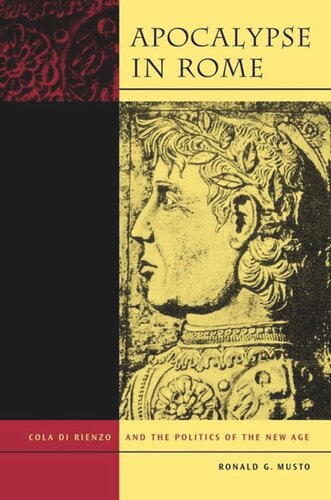

Most ebook files are in PDF format, so you can easily read them using various software such as Foxit Reader or directly on the Google Chrome browser.
Some ebook files are released by publishers in other formats such as .awz, .mobi, .epub, .fb2, etc. You may need to install specific software to read these formats on mobile/PC, such as Calibre.
Please read the tutorial at this link: https://ebookbell.com/faq
We offer FREE conversion to the popular formats you request; however, this may take some time. Therefore, right after payment, please email us, and we will try to provide the service as quickly as possible.
For some exceptional file formats or broken links (if any), please refrain from opening any disputes. Instead, email us first, and we will try to assist within a maximum of 6 hours.
EbookBell Team

4.4
102 reviewsOn May 20, 1347, Cola di Rienzo overthrew without violence the turbulent rule of Rome’s barons and the absentee popes. A young visionary and the best political speaker of his time, Cola promised Rome a return to its former greatness. Ronald G. Musto’s vivid biography of this charismatic leader—whose exploits have enlivened the work of poets, composers, and dramatists, as well as historians—peels away centuries of interpretation to reveal the realities of fourteenth-century Italy and to offer a comprehensive account of Cola’s rise and fall.
A man of modest origins, Cola gained a reputation as a talented professional with an unparalleled knowledge of Rome’s classical remains. After earning the respect and friendship of Petrarch and the sponsorship of Pope Clement VI, Cola won the affections and loyalties of all classes of Romans. His buono stato established the reputation of Rome as the heralded New Jerusalem of the Apocalypse and quickly made the city a potent diplomatic and religious center that challenged the authority—and power—of both pope and emperor.
At the height of Cola’s rule, a conspiracy of pope and barons forced him to flee the city and live for years as a fugitive until he was betrayed and taken to Avignon to stand trial as a heretic. Musto relates the dramatic story of Cola’s subsequent exoneration and return to central Italy as an agent of the new pope. But only weeks after he reestablished his government, he was slain by the Romans atop the Capitoline hill.
In his exploration, Musto examines every known document pertaining to Cola’s life, including papal, private, and diplomatic correspondence rarely used by earlier historians. With his intimate knowledge of historical Rome—its streets and ruins, its churches and palaces, from the busy Tiber riverfront to the lost splendor of the Capitoline—he brings a cinematic flair to this fascinating historical narrative.